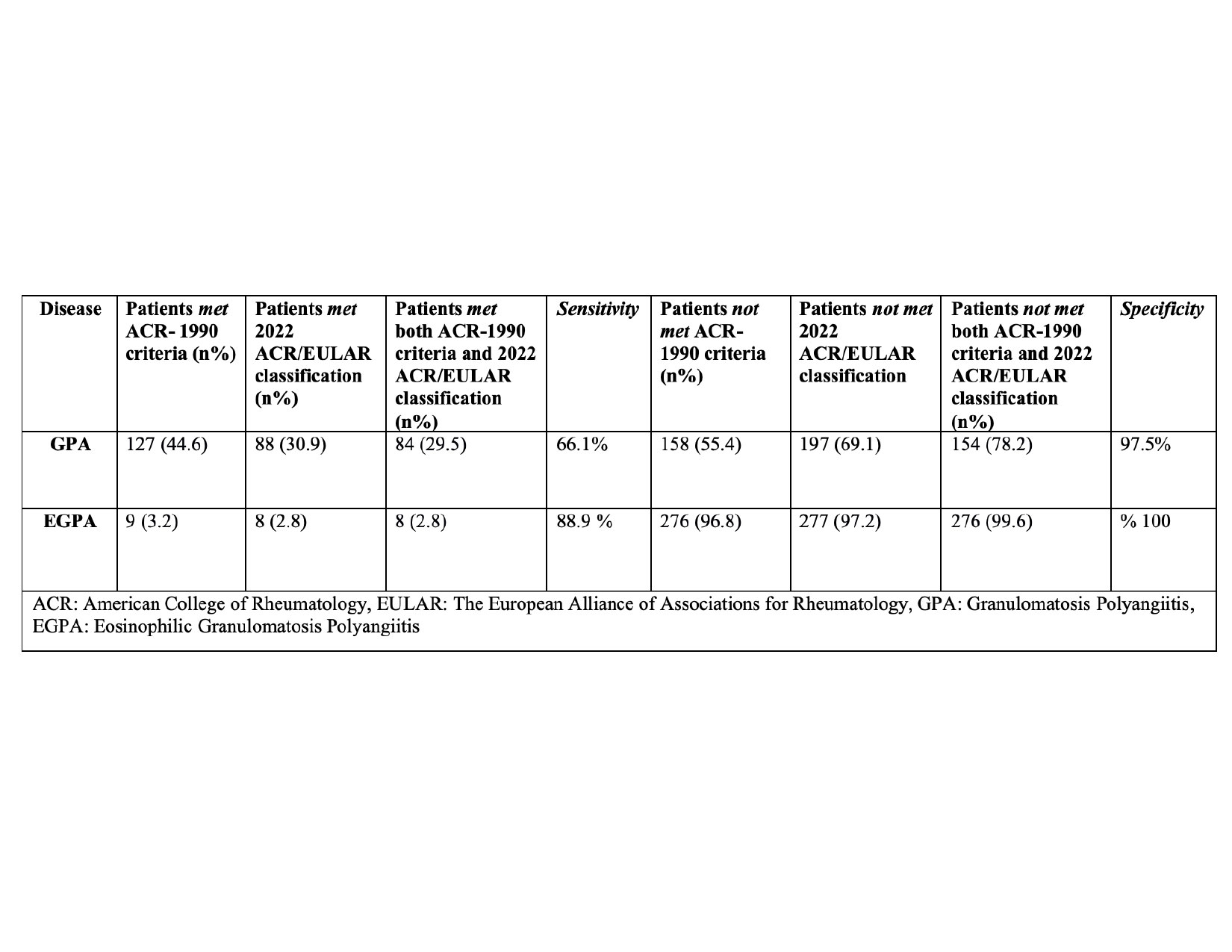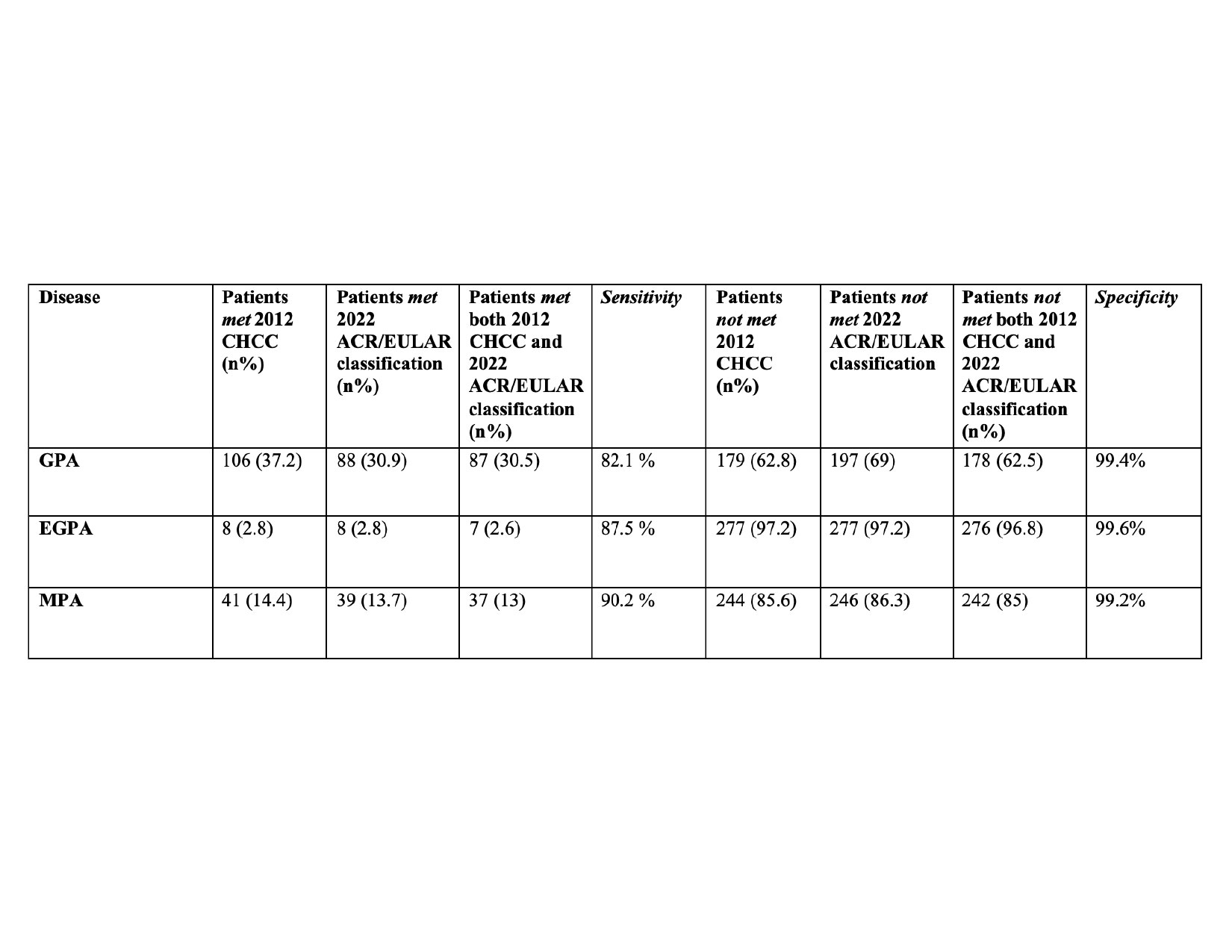Session Information
Date: Saturday, November 12, 2022
Title: Vasculitis – ANCA-Associated Poster I: Epidemiology, Outcomes, and Classification
Session Type: Poster Session A
Session Time: 1:00PM-3:00PM
Background/Purpose: The American College of Rheumatology (ACR)-1990 criteria is the most used method for the classification of ANCA Associated Vasculitis (AAV). However, with ACR-1990 criteria, Microscopic Polyangiitis (MPA) patients can not be classified. International Chapel Hill classification criteria (CHCC) improved definitions with proteinase-3 (PR3)-ANCA and myeloperoxidase (MPO)-ANCA tests. Recently, DCVAS group using the largest vasculitis cohort developed 2022 American College of Rheumatology/European Alliance of Associations for Rheumatology Classification Criteria (2022 ACR/EULAR). Our aim was to test the new 2022 ACR/EULAR classification criteria in a multicenter vasculitis cohort compared to previous criteria.
Methods: In this retrospective cohort study, patients from four tertiary Rheumatology centers in Turkey with the diagnosis of AAV were included. Patients were classified as GPA, EGPA, and MPA according to 2012 CCHC by clinician. For an external validation, our IgA cohort (classified according to 2012 CCHC) were used as a comparator1. We combined the two cohorts and tested the 2022 ACR/EULAR classification criteria in all patients. For the sensitivity and specificity analysis ACR-1990 criteria and 2012 CCHC were used as reference and Chi-square test were used for comparison.
Results: A total number of 154 AAV patients were included in the study. The mean age was 47.6±14 years and 51% were female. IgA cohort consisted of 130 patients with a mean age of 42.2±17 years and 34.6% were female. PR3-ANCA and MPO-ANCA was positive in 73 (47.1%) and 45 (29.4%) patients, respectively in AAV patients. Within the whole group (n=285), 127 (44.6%) and 88 (30.9%) patients were classified as GPA according to ACR-1990 criteria and 2022 ACR/EULAR criteria, respectively. One hundred and fifty-four patients (78.2%) did not meet both criteria for GPA. ACR-1990 criteria classified 9 (3.2%) and 2022 ACR/EULAR criteria 8 (2.8%) patients as EGPA. Sensitivity was 66.1% in GPA and 88.9% in EGPA while specificity was 97.5% in GPA and 100% in EGPA for 2022 ACR/EULAR criteria if the ACR-1990 criteria was considered as the gold standard (table-1). For MPA, we considered CHCC as the gold standard, the sensitivity and specificity of new criteria was 90.2 % and 99.2%, respectively. Similarly, sensitivity and specificity were better in GPA and EGPA patients when CHCC is the reference (table-2).
Conclusion: Our study showed that the performance of 2022 ACR/EULAR criteria was satisfactory in this multicentre vasculitis cohort. The only exception was the low sensitivity in GPA patients associated with the classification of PR3-ANCA negative patients as GPA with ACR-1990 criteria while these patients were less likely to meet 2022 ACR/EULAR criteria. Sensitivity of GPA criteria improved when CHCC was used as the gold standart, suggesting a better understanding of AAV after ANCA testing and biopsy definitions in recent decades.
Reference: 1- Gazel et al. Clin Exp Rheumatol. 2020
To cite this abstract in AMA style:
Gazel U, Can Sandikci S, Omma A, Kocaer S, Onen F, Gercik O, Akar S, Abacar K, Asicioglu E, Tuglular S, Alibaz-Oner F, Direskeneli H. Performance of 2022 American College of Rheumatology/European Alliance of Associations for Rheumatology Classification Criteria in Turkish Vasculitis Patients [abstract]. Arthritis Rheumatol. 2022; 74 (suppl 9). https://acrabstracts.org/abstract/performance-of-2022-american-college-of-rheumatology-european-alliance-of-associations-for-rheumatology-classification-criteria-in-turkish-vasculitis-patients/. Accessed .« Back to ACR Convergence 2022
ACR Meeting Abstracts - https://acrabstracts.org/abstract/performance-of-2022-american-college-of-rheumatology-european-alliance-of-associations-for-rheumatology-classification-criteria-in-turkish-vasculitis-patients/


